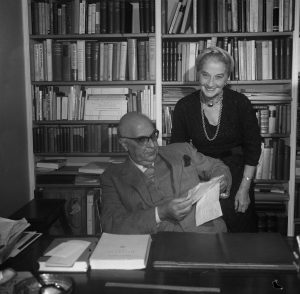On 18 October 1979, sixteen years after George Seferis was awarded the Nobel Prize for Literature, it was the turn of the poet Odysseus Elytis.
From TO VIMA of October 19, 1979:
‘Odysseas Elytis was awarded the Nobel Prize for Literature for 1979 yesterday. In Stockholm, at two in the afternoon, the Swedish Academy announced that the Nobel had been given to the Greek poet “for his poetry, which, against the background of Greek tradition, depicts with sensuous strength and intellectual clear-sightedness the struggle of modern man for freedom and creativeness.”
The rivals
‘Sixteen years ago, in October 1963, the Nobel Prize was awarded to a Greek author for the first time: on that occasion, the recipient was George Seferis. This time, despite the information that had been circulating for several months—which TO VIMA had first published in July—uncertainty prevailed until the very last. Elytis’s main rivals for the prize were two famous novelists: the Englishman Graham Green and the Turk Yaşar Kemal.

TO VIMA, 19.10.1979, TO VIMA | TA NEA Historical Archive
Congratulations
‘The poet was informed of his win by phone at home in Odos Skoufa, Athens, by TO VIMA’s Stockholm correspondent.
‘If the news caused a sensation abroad—the foreign news agencies reported it with long telegrams as the main news of the day—in Greece it led to outpourings of emotion, joy and national pride.
‘Among the first to hear the news and call Elytis to congratulate him were Prime Minister Karamanlis, the wife of the President of the Republic, Ioanna Tsatsos, Mrs. Maro Seferis, the widow of George Seferis, and the poet Yiannis Ritsos, who has often been mentioned as a potential recipient of the Nobel Prize himself in recent years.
Constantine Karamanlis
‘In his congratulatory telegram, Prime Minister Karamanlis wrote: “As a friend, I am proud of the high distinction bestowed on you. The Commission has rightly honored you, just as you—with your work—honor Greece, which the whole world is lauding in your name today.”
Andreas Papandreou
‘“The global recognition afforded to Odysseus Elytis is a just reward for his long literary presence. His work has been associated with the beauty of the Greece, with the dreams and sorrows of the Greek people. His award is a singular honor for our country and for every Greek.”
Yiannis Ritsos:
‘”The award of the Nobel Prize to our great Greek poet Odysseus Elytis honors not Odysseus Elytis, but the Nobel itself.”
Nikos Gatsos
‘”I was delighted to learn that the Nobel Prize had been awarded to Odysseus Elytis. The Swedish Academy’s decision honors the Academy itself above all else, because it has chosen an undoubted great among poets. As his friend, I hope and believe Elytis will not rest on his laurels, but continue to reveal the boldness and truth of his visions to the nation.”
Mikis Theodorakis
‘”As a Greek and as an artist, I cannot but celebrate this great honor that puts both Greece and Greek Art into the international spotlight. In the person of Elytis, all of Greek poetry is awarded, all of Greek art, the Greek people all.”
Elytis’ own statement
‘”As you can understand, it is only natural that the decision of the Swedish Academy has touched me truly.
‘”I knew that I had been nominated this year, for the first time, but I didn’t think I had much chance of being awarded the Nobel Prize.
‘”That was because I had heard the rumors about the Nobel: that it requires years of preparation, connections, contacts, things that do not suit me and are entirely incompatible with my temperament.
‘”And yet, behold: all that turns out to have been a myth. And I hope it will serve as a lesson of sorts for those younger than myself, who can rest assured that, if they do their job properly, their hard work will one day be rewarded.
‘”I believe that with this year’s decision, the Swedish Academy sought to honor through me contemporary post-Seferis Greek poetry in its entirety, which is truly at a very high level.
‘”Which is to say the Swedish Academy wanted to draw the world’s attention to the antiquity of Greek poetry, and a tradition that has remained unbroken since Homer.”
‘”That is why the honor is not mine alone; it belongs to everyone. It gives me joy that I was able, in this way too, to do my country a service.
‘”I should like to thank the Swedish Academy both on my behalf and on behalf of my country, as a poet and as a Greek”.
‘Asked how he thought he would use the $190,000 that accompanied the Nobel Prize, he said:
‘”I haven’t thought about that yet. Right now, I’m more concerned about the speech I have to write, to deliver at the awards ceremony in Stockholm, which I will of course be attending.”
‘In response to a question about what poetry meant to him, Elytis replied:
‘”I see poetry as a source of innocence, full of revolutionary forces. My mission is to direct these forces against a world my conscience cannot accept, and to bring that world, through ongoing transformations, into closer harmony with my dreams.”’
What happened after Odysseus Elytis was awarded the Nobel Prize for Literature
On 18 October 1979, sixteen years after George Seferis was awarded the Nobel Prize for Literature, it was the turn of the poet Odysseus Elytis.
From TO VIMA of October 19, 1979:
‘Odysseas Elytis was awarded the Nobel Prize for Literature for 1979 yesterday. In Stockholm, at two in the afternoon, the Swedish Academy announced that the Nobel had been given to the Greek poet “for his poetry, which, against the background of Greek tradition, depicts with sensuous strength and intellectual clear-sightedness the struggle of modern man for freedom and creativeness.”
The rivals
‘Sixteen years ago, in October 1963, the Nobel Prize was awarded to a Greek author for the first time: on that occasion, the recipient was George Seferis. This time, despite the information that had been circulating for several months—which TO VIMA had first published in July—uncertainty prevailed until the very last. Elytis’s main rivals for the prize were two famous novelists: the Englishman Graham Green and the Turk Yaşar Kemal.

TO VIMA, 19.10.1979, TO VIMA | TA NEA Historical Archive
Congratulations
‘The poet was informed of his win by phone at home in Odos Skoufa, Athens, by TO VIMA’s Stockholm correspondent.
‘If the news caused a sensation abroad—the foreign news agencies reported it with long telegrams as the main news of the day—in Greece it led to outpourings of emotion, joy and national pride.
‘Among the first to hear the news and call Elytis to congratulate him were Prime Minister Karamanlis, the wife of the President of the Republic, Ioanna Tsatsos, Mrs. Maro Seferis, the widow of George Seferis, and the poet Yiannis Ritsos, who has often been mentioned as a potential recipient of the Nobel Prize himself in recent years.
Constantine Karamanlis
‘In his congratulatory telegram, Prime Minister Karamanlis wrote: “As a friend, I am proud of the high distinction bestowed on you. The Commission has rightly honored you, just as you—with your work—honor Greece, which the whole world is lauding in your name today.”
Andreas Papandreou
‘“The global recognition afforded to Odysseus Elytis is a just reward for his long literary presence. His work has been associated with the beauty of the Greece, with the dreams and sorrows of the Greek people. His award is a singular honor for our country and for every Greek.”
Yiannis Ritsos:
‘”The award of the Nobel Prize to our great Greek poet Odysseus Elytis honors not Odysseus Elytis, but the Nobel itself.”
Nikos Gatsos
‘”I was delighted to learn that the Nobel Prize had been awarded to Odysseus Elytis. The Swedish Academy’s decision honors the Academy itself above all else, because it has chosen an undoubted great among poets. As his friend, I hope and believe Elytis will not rest on his laurels, but continue to reveal the boldness and truth of his visions to the nation.”
Mikis Theodorakis
‘”As a Greek and as an artist, I cannot but celebrate this great honor that puts both Greece and Greek Art into the international spotlight. In the person of Elytis, all of Greek poetry is awarded, all of Greek art, the Greek people all.”
Elytis’ own statement
‘”As you can understand, it is only natural that the decision of the Swedish Academy has touched me truly.
‘”I knew that I had been nominated this year, for the first time, but I didn’t think I had much chance of being awarded the Nobel Prize.
‘”That was because I had heard the rumors about the Nobel: that it requires years of preparation, connections, contacts, things that do not suit me and are entirely incompatible with my temperament.
‘”And yet, behold: all that turns out to have been a myth. And I hope it will serve as a lesson of sorts for those younger than myself, who can rest assured that, if they do their job properly, their hard work will one day be rewarded.
‘”I believe that with this year’s decision, the Swedish Academy sought to honor through me contemporary post-Seferis Greek poetry in its entirety, which is truly at a very high level.
‘”Which is to say the Swedish Academy wanted to draw the world’s attention to the antiquity of Greek poetry, and a tradition that has remained unbroken since Homer.”
‘”That is why the honor is not mine alone; it belongs to everyone. It gives me joy that I was able, in this way too, to do my country a service.
‘”I should like to thank the Swedish Academy both on my behalf and on behalf of my country, as a poet and as a Greek”.
‘Asked how he thought he would use the $190,000 that accompanied the Nobel Prize, he said:
‘”I haven’t thought about that yet. Right now, I’m more concerned about the speech I have to write, to deliver at the awards ceremony in Stockholm, which I will of course be attending.”
‘In response to a question about what poetry meant to him, Elytis replied:
‘”I see poetry as a source of innocence, full of revolutionary forces. My mission is to direct these forces against a world my conscience cannot accept, and to bring that world, through ongoing transformations, into closer harmony with my dreams.”’




